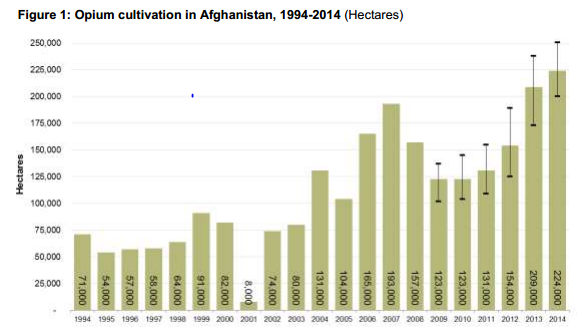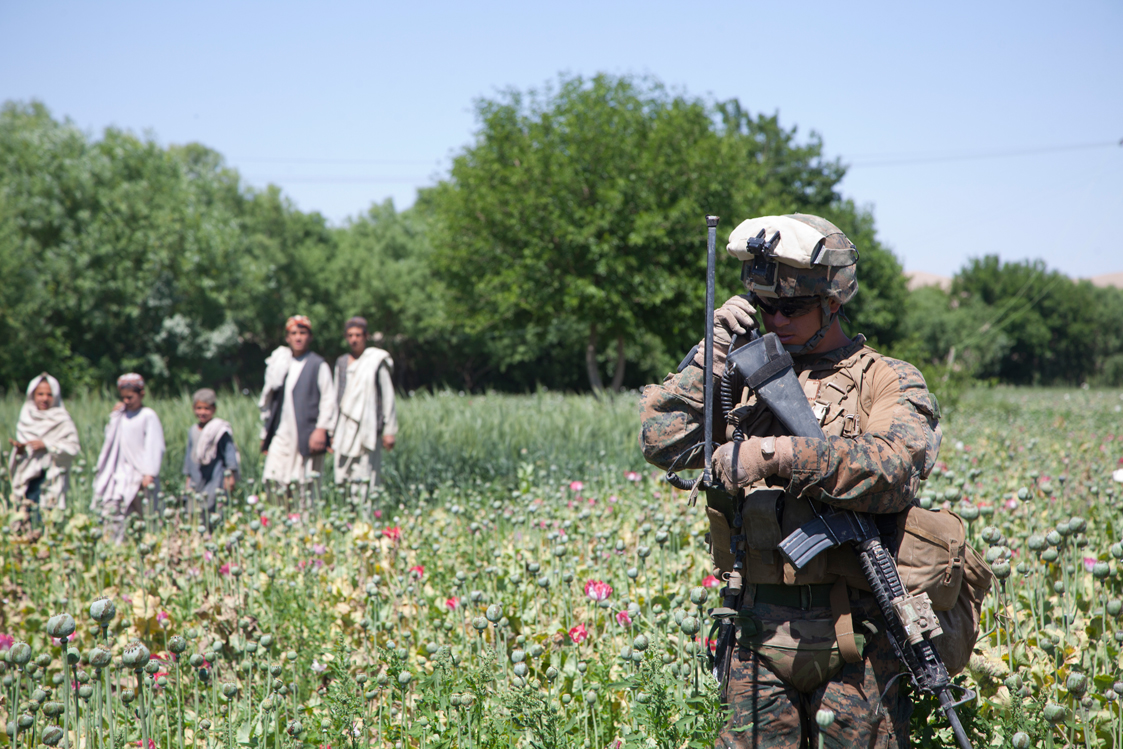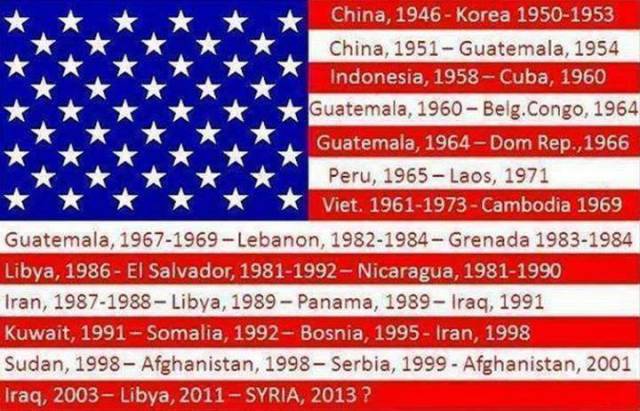It looks like you're using an Ad Blocker.
Please white-list or disable AboveTopSecret.com in your ad-blocking tool.
Thank you.
Some features of ATS will be disabled while you continue to use an ad-blocker.
share:
Back to the good old days...

What happened in 2001?
Taliban's Ban On Poppy A Success, U.S. Aides Say
Why Osama Bin Laden was hiding in Afghanistan according to the experts? Because he knew that the US forces will come in, defeat the Taliban and secure the heroin business.

Kosovo was detached from Serbia only to ensure a secure path of heroin to Europe.
Kosovo: Europe’s Mafia State. Hub of the EU-NATO Drug Trail
Now all well and good.
The UN says opium poppy growth in Afghanistan will rise to record levels by the end of 2014. A report by the organization says there is a 7 percent increase in land being cultivated despite the US spending over $7 billion on counter narcotics programs.

What happened in 2001?
The first American narcotics experts to go to Afghanistan under Taliban rule have concluded that the movement's ban on opium-poppy cultivation appears to have wiped out the world's largest crop in less than a year, officials said today.
Taliban's Ban On Poppy A Success, U.S. Aides Say
Why Osama Bin Laden was hiding in Afghanistan according to the experts? Because he knew that the US forces will come in, defeat the Taliban and secure the heroin business.

Kosovo was detached from Serbia only to ensure a secure path of heroin to Europe.
Kosovo: Europe’s Mafia State. Hub of the EU-NATO Drug Trail
Now all well and good.
Someone has to supply the pharmacuetical companies with the Opium they need to feed the worlds hunger for pain pills. What a sad affair. If we go back
pre-911 their was not nearly as many people addicted to the very strong pain meds Oxycotin, etc. I sometimes wonder if this was one of the reasons
they wanted Afghanistan so badly. Its really a win win for the Government of the US, they can still be paid off by the Pharmaceutical companies and
keep their war on drugs bringing in money. And also send thousands and thousands to prison, reaping in all the benefits from every angle we look at.
edit on 12-11-2014 by Glassbender777 because: (no reason given)
originally posted by: Glassbender777
Someone has to supply the pharmaceutical companies with the Opium they need to feed the worlds hunger for pain pills. What a sad affair. If we go back pre-911 there was not nearly as many people addicted to the very strong pain meds Oxycontin, etc. I sometimes wonder if this was one of the reasons they wanted Afghanistan so badly. Its really a win win for the Government of the US, they can still be paid off by the Pharmaceutical companies and keep their war on drugs bringing in money. And also send thousands and thousands to prison, reaping in all the benefits from every angle we look at.
Your perspective on this subject makes more sense than anything I have previously read about the CIA coverup on the OPium fields. So many people young and old are addicted to their pain pills and will pay a big price for it on the streets because their prescription doesn't last the month for them. In my opinion, "Anytime the government gets involved in something it always does just the opposite of what it is suppose to do".
There were news articles on CNN about how all the Opium grown in Afghanistan was giving the country much needed revenue. In exchange, the Opium was
being used for pain medication for US troops injured in battle.
a reply to: Glassbender777
Except the worlds pharmaceutical companies get their opium from other countries.
Someone has to supply the pharmacuetical companies with the Opium they need to feed the worlds hunger for pain pills.
Except the worlds pharmaceutical companies get their opium from other countries.
Yes the Afghani crop goes to the illicit drug trade not the pharma giants.....That way the government can funnel the profits into deep black projects
as well as enrich its minions......
Bill and Hillary could have a story to tell about that kind of thing in Arkansaw....The Bushes too could be informative ......they arte the ones we need to waterboard....
Bill and Hillary could have a story to tell about that kind of thing in Arkansaw....The Bushes too could be informative ......they arte the ones we need to waterboard....
a reply to: stirling
...and do not forget the social and health problems of the so called "hostile" countries, caused by heroin.
Good old technic, as it was in the Opium Wars.
...and do not forget the social and health problems of the so called "hostile" countries, caused by heroin.
Good old technic, as it was in the Opium Wars.
The Opium Wars arose from China’s attempts to suppress the opium trade. British traders had been illegally exporting opium to China, and the resulting widespread addiction was causing serious social and economic disruption in the country.
Over the last decade or two prescription narcotic pain pill abuse has grown immensely in the US. Some say these record opium crops have resulted in
more heroin on the streets in the US. The timing is great for the venture capitalistic because heroin will give the Rx pain pill addicts their fix and
thanks to the abundant opium, at a much lower black market price than Oxycontin.
Surely this is just a coincidence.
Surely this is just a coincidence.
edit on 12-11-2014 by jrod because: dissapearing words
There was a fascinating Max Keiser show a few years ago where he said when he worked on Wall Street, it was well known that every Friday night the
armored trucks would pull up in front of the big Wall Street banks and bring in the money that needed to be laundered from the drug trade. Everyone
knew about it, that's one of the ways the U.S. government (AKA the big banks) financed the Black Budget items.
I keep wondering when the 19 year olds that keep volunteering to die and be dismembered for the banksters will figure it out, but there's an unending supply of idiots with flag-waving parents who think war is like a high school football game.
Must be eye-opening when you end up in Afghanistan guarding poppy fields and terrorizing innocent villagers.
I keep wondering when the 19 year olds that keep volunteering to die and be dismembered for the banksters will figure it out, but there's an unending supply of idiots with flag-waving parents who think war is like a high school football game.
Must be eye-opening when you end up in Afghanistan guarding poppy fields and terrorizing innocent villagers.
a reply to: maghun
Great post. I've known about this for a while minis the Kososvo part. It leads me to wonder, when was the last remotely justifiable war? All the wars in my lifetime have had massive ulterior motives. Afghanistan is not even as bad as Libya or Iraq IMO.
Great post. I've known about this for a while minis the Kososvo part. It leads me to wonder, when was the last remotely justifiable war? All the wars in my lifetime have had massive ulterior motives. Afghanistan is not even as bad as Libya or Iraq IMO.
a reply to: tavi45
Each country has its own (hi)story. Or exploitable resources?

Afghanistan (or the taliban regime) first was "used" against the Soviet Union according to Brzezinski. The picture is from 2013, but in 2001 it mentions only Iraq. The afghan "mission" only restored the order (and the poppy fields).
Each country has its own (hi)story. Or exploitable resources?

Afghanistan (or the taliban regime) first was "used" against the Soviet Union according to Brzezinski. The picture is from 2013, but in 2001 it mentions only Iraq. The afghan "mission" only restored the order (and the poppy fields).
>U.S. spending billions of dollars to combat opium production
>Opium production suddenly surges
It doesn't take too many brain cells to figure out what's really going on.
>Opium production suddenly surges
It doesn't take too many brain cells to figure out what's really going on.
originally posted by: trollz
>U.S. spending billions of dollars to combat opium production
>Opium production suddenly surges
It doesn't take too many brain cells to figure out what's really going on.
Yes that's right in America we have the war on drugs over there we have the war for drugs. Isn't spreading Democracy great.
Makes sense with everything else. They basically allowed this drug into the hands of millions, then they combat it AFTER everyone's hooked on it.
Now, instead of your traditional drug abusers, you have average citizen taking to the black market to get a hold of a drug, one that's been addicting
for centuries.
Good points herein... and another thing, opiates don't necessarily make lazy addicts... actually, the addicts it makes are content little workers who
don't eat or sleep too much and are very, very loyal.
Pimps have been using it for a long time.
If someone had the ability to whip up the perfect enslavement mechanism via gene splicing years ago, I'd nominate the poppy as the result.
Pimps have been using it for a long time.
If someone had the ability to whip up the perfect enslavement mechanism via gene splicing years ago, I'd nominate the poppy as the result.
edit
on 11/12/2014 by Baddogma because: (no reason given)
How many mangled vets as well as civilians in Afghanistan now self-medicate?
Those in pain will do whatever necessary to control it, it's human nature as much as eating or breathing.
Only problem is once the pain is gone the addiction remains.
Which makes great business for the CIA to fund black budget projects.
Nice little circle, isn't it?
Those in pain will do whatever necessary to control it, it's human nature as much as eating or breathing.
Only problem is once the pain is gone the addiction remains.
Which makes great business for the CIA to fund black budget projects.
Nice little circle, isn't it?
a reply to: Asktheanimals
Seemingly Omar wasn't aware of this kind of business:
Was it taken into account when the planning of 911 happened? (rethorical question...)
laundered drug money
Seemingly Omar wasn't aware of this kind of business:
In July 2000, Taliban leader Mullah Mohammed Omar, collaborating with the United Nations to eradicate heroin production in Afghanistan, declared that growing poppies was un-Islamic, resulting in one of the world's most successful anti-drug campaigns. The Taliban enforced a ban on poppy farming via threats, forced eradication, and public punishment of transgressors. The result was a 99% reduction in the area of opium poppy farming in Taliban-controlled areas, roughly three quarters of the world's supply of heroin at the time
Was it taken into account when the planning of 911 happened? (rethorical question...)
new topics
-
Mass Extinctions May Hold the Key to Life in the Universe
Education and Media: 2 hours ago -
Can we be certain that Jesus Christ was born on December 25th?
Religion, Faith, And Theology: 4 hours ago -
RIP Merrily Harpur British Big Cat Realist
Cryptozoology: 6 hours ago
top topics
-
Panamanian President-“every square meter” of the Panama Canal belongs to Panama.
New World Order: 13 hours ago, 12 flags -
Australian mercenary caught and crying as he is a prisoner of war.
Other Current Events: 12 hours ago, 10 flags -
NYPD arrests migrant who allegedly set woman on fire on subway train, watched her burn to death
Breaking Alternative News: 16 hours ago, 9 flags -
JILL BIDEN Wants JOE to Punish Democrats Who Forced Him to Leave Office in Disgrace on 1.20.2025.
2024 Elections: 13 hours ago, 9 flags -
RIP Merrily Harpur British Big Cat Realist
Cryptozoology: 6 hours ago, 6 flags -
Mass Extinctions May Hold the Key to Life in the Universe
Education and Media: 2 hours ago, 3 flags -
Can we be certain that Jesus Christ was born on December 25th?
Religion, Faith, And Theology: 4 hours ago, 2 flags
active topics
-
Can we be certain that Jesus Christ was born on December 25th?
Religion, Faith, And Theology • 21 • : TheLieWeLive -
-@TH3WH17ERABB17- -Q- ---TIME TO SHOW THE WORLD--- -Part- --44--
Dissecting Disinformation • 3791 • : Thoughtful3 -
The Daily Mail trying to imply “it’s aliens”
Dissecting Disinformation • 16 • : andy06shake -
Panamanian President-“every square meter” of the Panama Canal belongs to Panama.
New World Order • 20 • : fringeofthefringe -
NYPD arrests migrant who allegedly set woman on fire on subway train, watched her burn to death
Breaking Alternative News • 25 • : Flyingclaydisk -
F-18 shot down over Red Sea....by our own Destroyer?
Other Current Events • 13 • : Cosmo14 -
Mass Extinctions May Hold the Key to Life in the Universe
Education and Media • 1 • : BeyondKnowledge3 -
Australian mercenary caught and crying as he is a prisoner of war.
Other Current Events • 32 • : BedevereTheWise -
‘Something horrible’: Somerset pit reveals bronze age cannibalism
Ancient & Lost Civilizations • 19 • : Scratchpost -
RIP Merrily Harpur British Big Cat Realist
Cryptozoology • 2 • : angelchemuel
